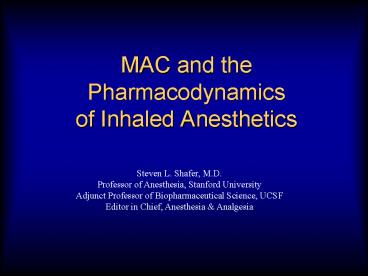MAC and the Pharmacodynamics of Inhaled Anesthetics - PowerPoint PPT Presentation
1 / 43
Title:
MAC and the Pharmacodynamics of Inhaled Anesthetics
Description:
Adjunct Professor of Biopharmaceutical Science, UCSF. Editor in Chief, Anesthesia & Analgesia ... Common Pharmacodynamic Properties of Inhaled Anesthetics ... – PowerPoint PPT presentation
Number of Views:1954
Avg rating:3.0/5.0
Title: MAC and the Pharmacodynamics of Inhaled Anesthetics
1
MAC and the Pharmacodynamics of Inhaled
Anesthetics
Steven L. Shafer, M.D. Professor of Anesthesia,
Stanford University Adjunct Professor of
Biopharmaceutical Science, UCSF Editor in Chief,
Anesthesia Analgesia
2
First There Was Ether
Dr. Crawford Long, Jefferson, GA, 1842
3
Then Came Nitrous Oxide
Dr. Horace Wells, Hartford, CT, 1844
4
Then There Was Ether, Again
Dr. William Morton, Boston, MA, 1846
5
What Does Ether Do?
Guedels Signs of Ether Anesthesia
6
Common Pharmacodynamic Properties of Inhaled
Anesthetics
- Initially cause excitement (patient is literally
intoxicated) - Higher doses cause loss of consciousness
- Even higher doses suppress movement response to
noxious stimulation - Higher doses depress myocardial contractility,
cause vasodilation - Blood pressure falls
- Higher doses suppress ventilation
7
What is MAC
- A widely used measure of anesthetic potency
- The steady state expired gas concentration that
suppresses a purposeful response to noxious
stimulation in 50 of patients.
8
Common Pharmacodynamic Properties of Inhaled
Anesthetics
Increasing Anesthetic Depth
MAC Fraction
9
What is Anesthesia
- No universally accepted definition
- Usually thought to consist of
- Oblivion
- Amnesia
- Analgesia
- Lack of Movement
- Hemodynamic Stability
10
Inhaled Anesthetics Are Complete Anesthetics
Oblivion
No Movement
Hemodynamic Response Attenuated
11
Ether, Chloroform, Cyclopropane
- Ether Very slow onset, explosive
- Chloroform Slow onset, highly toxic
- Cyclopropane Fast onset, highly explosive
12
Halothane, Methoxyflurane
- Halothane First modern anesthetic
- Rotted livers
- Metabolized by the liver
- Caused ventricular arrhythmia
- Methoxyflurane
- Rotted kidneys (released fluoride)
13
Enflurane, Isoflurane,
- Introduced late 1970s, early 1980s
- Isoflurane is still widely used
- Pungent odor, rapid onset, rapid offset
14
Sevoflurane, Desflurane
- Introduced in the 1990s
- Sevoflurane has fast onset, smells OK
- Desflurane has VERY fast onset / offset, very
pungent
15
Nitrous Oxide, Xenon
- Nitrous is still widely used
- Potent analgesic (NMDA antagonist)
- MAC 120
- Xenon
- Also a potent analgesia (NMDA antagonist)
- MAC is around 80
- Just an atom!
- Hmmmm what does that say about the site of
action?
16
What is Anesthesia?
17
What is Anesthesia?
18
Opioids and Hypnotics
19
Inhalational anesthetic - opioid interaction
Adapted from Glass and Sebel
20
What is Anesthesia?
21
How Do Inhaled Anesthetics Work?
- Unknown!
- After 150 years, we still dont understand how
inhaled anesthetics work. - The biggest mystery in pharmacology
22
Immobility is a SPINAL Effect
We know where, just not how
23
However, the molecular site of action is unknown
24
Intriguing Properties
- Meyer-Overton Hypothesis
- MAC correlates with lipophilicity
- Promiscuous receptor activity
- Low intersubject variability
- Conserved across species
- Additivity
25
Anesthetic Structure
26
Meyer Overton Observation
27
Low Intersubject Variability
- For most intravenous hypnotics, the dose at which
95 of the population is unresponsive is
100-200 of the dose at which 5 of the
population is unresponsive. - For inhaled anesthetics, an ED95 is only about
20 higher than an ED5.
28
Promiscuous Pharmacology
29
Conserved Across Species
30
Age Affects MAC
31
Where do Inhaled Anesthetics Act?
- GABA SHLA mouse has same MAC, picrotoxin has
same effect on cyclopropane MAC as halothane MAC - Nicotinic antagonists dont affect MAC,
non-immobilizer is effective nicotinic antagonist - Glycine ceiling effect of strychnine
- NMDA non-immobilizer blocks NMDA, MK-801
insufficiently efficacious - Kainate GluR6 knockout doesn't change MAC.
- AMPA GluR2 knockout doesn't change MAC.
- Adrenergic depletion of a2 receptors doesnt
change MAC - Serotonin ondansetron administration doesn't
change MAC. Nonimmobilizer blocks 5-HT2C - Potassium channels existing knockouts dont
change MAC - Opioids naloxone doesnt change MAC
Courtesy of Ted Eger
32
Display of interactions
Immobility
Hypnosis
33
Display of Hypothesis (IV Agents) What We
Predict
Immobility
Hypnosis
34
Results
Human data Animal data Combined data
35
Conclusion
- Additivity usually applies when anesthetics act
identically at a single site - additivity supports, but does not prove, a single
site of action. - Additivity is the exception for the interaction
of intravenous drugs that are known to target
different receptors relevant to the anesthetic
state.
36
Inhaled Anesthetic Interactions
37
Interactions between inhaled agents and IV agents
are most often synergistic, making those
receptors less likely targets as sites of action
of inhaled agents.
38
Human data Animal
data
Immobility
Immobility
Hypnosis
Hypnosis
39
Human data Animal
data
Immobility
Immobility
Hypnosis
Hypnosis
Wrong MAC N2O estimate in rats or true antagonism?
40
Human data Animal
data
Immobility
Immobility
Hypnosis
Hypnosis
there should be synergy with at least some
combinations...
41
Different AnestheticsAct at Different Receptors
Courtesy of Ted Eger
42
STRICTLY ADDITIVE INTERACTIONS
Courtesy of Ted Eger
43
Conclusion
- For years, we have pursued protein based
mechanisms of anesthetic action, focused on ion
channels - No single ion channel can explain the inhaled
anesthetic action - It has been postulated that multiple discrepant
effects on proteins may be responsible for
inhaled anesthetic action. - STRICT ADDITIVITY has pushed us back to a unitary
site of inhaled anesthetic action.































